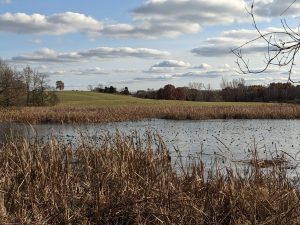As Michigan voters head to the polls on November 8, residents in three Washtenaw County townships—Dexter, Scio, and Northfield—have the ability to support important land preservation millages.
Legacy Land Conservancy has fifty-years of experience and knowledge that clearly demonstrates the community benefits of protecting locally important lands. It’s because of our experience working to protect and preserve land in southern Michigan that we support public efforts to fund local land protection through millages. In fact, millages in Washtenaw County have been instrumental in the protection of over 20,000 acres by the conservation community and municipal partners over the last thirty years.
Community planning that protects natural areas and farmland provides flexibility for growth and development, offering a hedge against fragmented suburban development while supporting a diversified economic base. Further, this effort helps build resiliency against the impacts of climate change. Natural areas buffer floods, hold groundwater in times of drought, cool the air, and provide habitat to fauna and flora trying to adapt to changing temperatures. Preservation of local farms protects the continued viability of our local agriculture-based communities, and holds space for us to exercise and reimagine our relationship with local food production.
If passed or renewed, the Scio, Dexter, and Northfield Township land preservation millages would augment similar efforts supported by voters in Ann Arbor Township, Webster Township, the city of Ann Arbor (the City’s Greenbelt Program), and in Washtenaw County (Washtenaw County’s Natural Areas Preservation Program (NAPP)). The three proposed millages will help to maintain or create a funding base for enhanced land protection right here in our community.
There are few county or municipal-led programs around the country. Legacy and the residents of Washtenaw County are very fortunate to live and work in an area with such demonstrated commitment to land conservation. Modest contributions from each household help to preserve natural areas and agricultural land, and the benefits to our community are priceless. Conserving natural areas and farmland helps to keep our region beautiful, attracts businesses and tourism, provides capacity for carbon storage and sequestration, provides wildlife habitat, filters our water, and provides flood mitigation during rain events.
If you live in one of the three communities voting on a land preservation millage, please take a look at the ballot language before you head to the polls.
Scio Township Proposal – Farmland and Open Space Land Preservation Millage
Scio Township’s millage is a renewal of a dedicated land preservation millage that was first passed by voters in 2004, and then renewed again in 2012. On the ballot is a proposed renewal of the current .4725 mill rate (previously authorized and expiring in 2023) and an additional .0275 mill for a new mill rate of .5. The program currently provides funds to preserve farmland, open space, wildlife habitat, scenic views, to protect drinking water sources and the water quality of rivers and streams, and provide new parks, recreational opportunities and trails. Click here for ballot language
Dexter Township Proposal – Dexter Township Farmland and Open Space Land Preservation Millage
In Dexter Township, voters are deciding on a land preservation millage for the first time. The Dexter Township Farmland and Open Space Land Preservation Millage would levy .50 mills for ten years and would fund a program to permanently preserve farmland, open space, wildlife habitat, scenic views, and protect drinking water sources and the water quality of rivers and streams. Click here for ballot language
Northfield Township Proposal – Farmland and Adjoining Natural Area Preservation Millage
Northfield Township’s Farmland and Adjoining Natural Area Preservation Millage is a new millage that would levy .60 mills for five years. Northfield’s proposal would help fund the voluntary purchase of development rights for existing farmland and adjoining natural areas. Click here for ballot language


 RSS Feed
RSS Feed